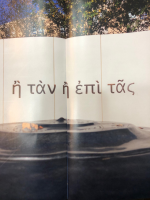All knowing board
- Thread starter Hugh Laurie
- Start date
You are using an out of date browser. It may not display this or other websites correctly.
You should upgrade or use an alternative browser.
You should upgrade or use an alternative browser.
This is a photo of the campus memorial to Lt. Michael Murphy. Lt. Murphy is the only alumn to win a Medal of Honor. Per the website, "This memorial to Lt. Michael P. Murphy at Penn State University, required lettering of an ancient Greek quote that reads 'with it or on it', referring to the warrior's shield when returning from battle."This was in the President's Report On Philanthropy and Endowments and I was hoping that someone here can translate it into English.
View attachment 443731
Right click on imageThis was in the President's Report On Philanthropy and Endowments and I was hoping that someone here can translate it into English.
View attachment 443731
Select Search image with Google in drop-down
Under resulting image search, click on Translate
According to Plutarch, it's what a Spartan mother allegedly said to her son as he was leaving for war, "With your shield or on it." One interpretation of the message I heard and haven't seen anywhere else is that if you come home without a shield, you're a coward because you probably threw it and ran. Those shields were damn heavy and you could travel a helluva lot faster without it. In general, Spartans celebrated those who died in battle much more than those who survived and returned home. To me "on it" means that you were carried home dead by your comrades. You died with honor.

 www.loebclassics.com
www.loebclassics.com
16. Another, as she handed her son his shield, exhorted him, saying, “Either this or upon this.”b
bReferred to Gorgo as the author by Aristotle in his Aphorisms, as quoted by Stobaeus, Florilegium, vii. 31, but it is often spoken of as a regular Spartan custom. Cf., for example, the scholium on Thucydides, ii. 39. Ancient writers were not agreed whether the second half meant to fall upon the shield (dead or wounded) or to be brought home dead upon it. In support of the second (traditional) interpretation cf. Moralia, 235 a, and Valerius Maximus, ii. 7, ext. 2.
Sayings of Spartan Women: Chapter 5: Section 19
"Sayings of Spartan Women: Chapter 5: Section 19" published on by Loeb Classical Library.
16. Another, as she handed her son his shield, exhorted him, saying, “Either this or upon this.”b
bReferred to Gorgo as the author by Aristotle in his Aphorisms, as quoted by Stobaeus, Florilegium, vii. 31, but it is often spoken of as a regular Spartan custom. Cf., for example, the scholium on Thucydides, ii. 39. Ancient writers were not agreed whether the second half meant to fall upon the shield (dead or wounded) or to be brought home dead upon it. In support of the second (traditional) interpretation cf. Moralia, 235 a, and Valerius Maximus, ii. 7, ext. 2.
Last edited:
This is a photo of the campus memorial to Lt. Michael Murphy. Lt. Murphy is the only alumn to win a Medal of Honor. Per the website, "This memorial to Lt. Michael P. Murphy at Penn State University, required lettering of an ancient Greek quote that reads 'with it or on it', referring to the warrior's shield when returning from battle."
Thank you.
Am familiar with Lt Murphy but didn't know what the inscription meant. I had the honor of meeting his dad at the Lt Michael Murphy Seal Museum in West Sayville LI where he works as a volunteer. Lt Murphy is buried in Calverton National Cemetery on the north shore of LI. Here are a few pics from the Museum and from his burial site to which I was directed to by his dad.





